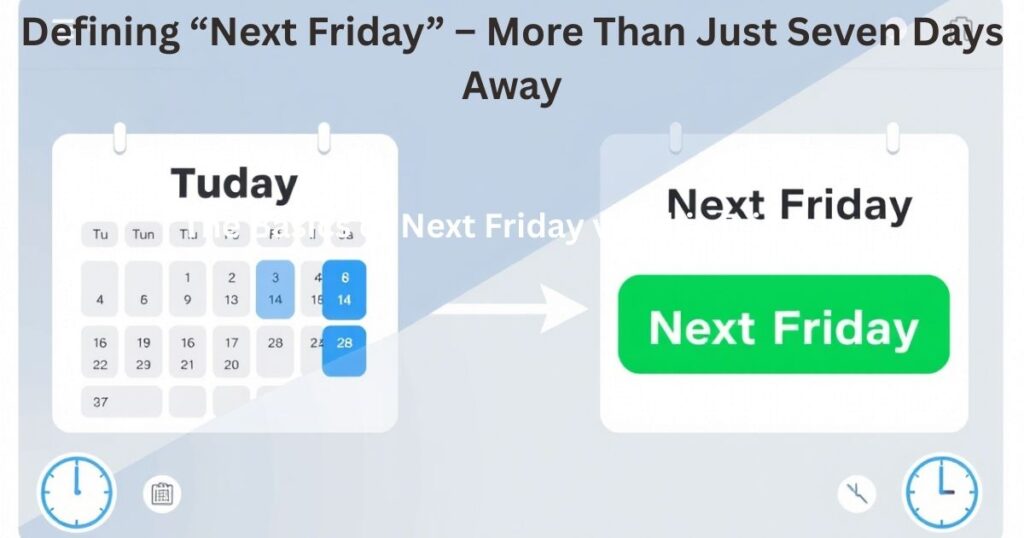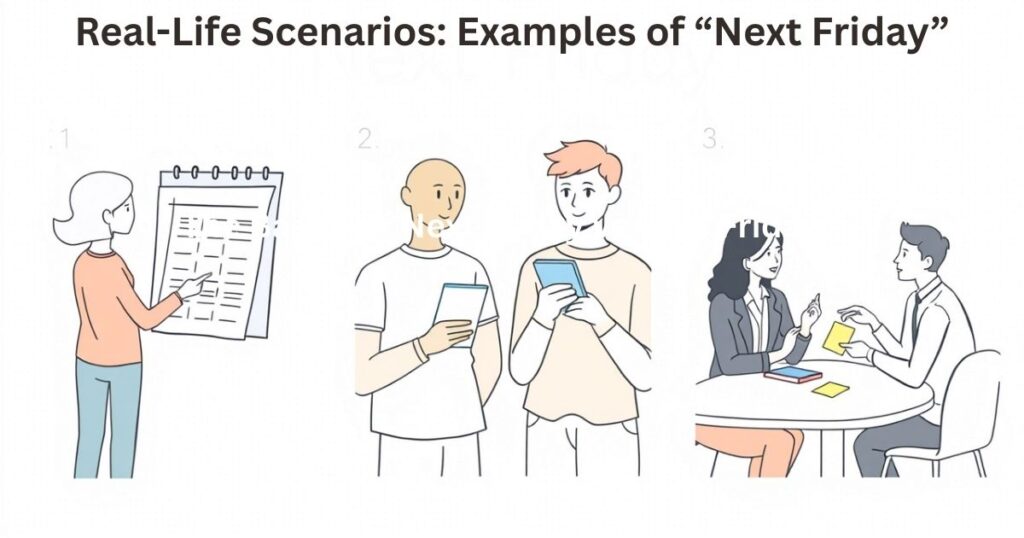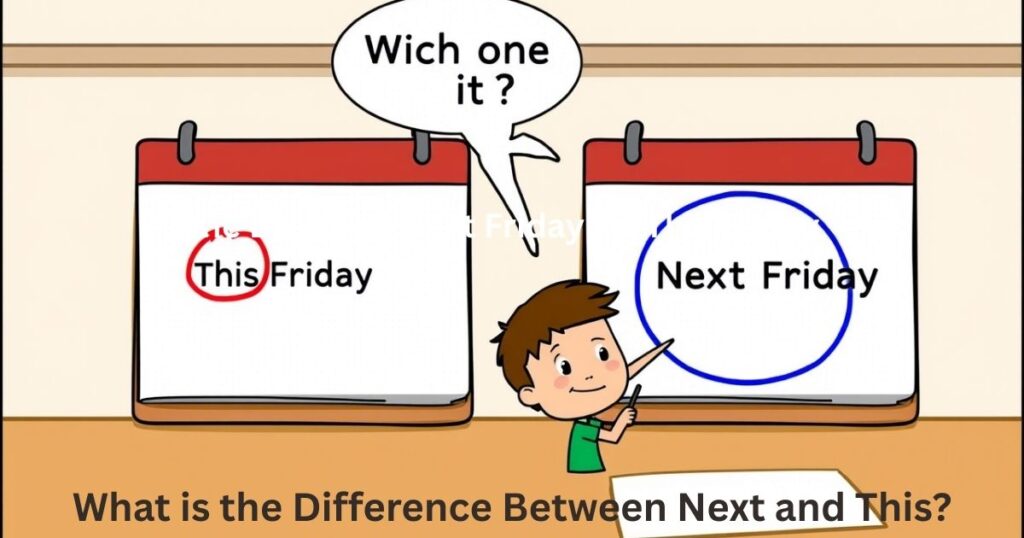Understanding the difference between Next Friday vs. This Friday can be tricky. These phrases often confuse people because their meaning changes with context, culture, and personal interpretation. When someone says “this Friday,” they usually mean the closest Friday to today. But “next Friday” might mean the Friday after that or sometimes the very next Friday, depending on who you ask.
This can make scheduling meetings, plans, or events harder than it should be. The challenge comes from how the calendar works and how people use these phrases in daily talk. In this article, we’ll look closely at Next Friday vs. This Friday to clear up confusion and help you communicate better. Whether it’s work deadlines or social events, knowing the difference saves time and avoids awkward calendar mistakes. Understanding Next Friday vs. This Friday makes planning easier.
The Basics of Next Friday vs. This Friday

Understanding the difference between “this Friday” and “next Friday” can be tricky, especially when planning events or meetings. Generally, “this Friday” refers to the Friday in the current week, while “next Friday” points to the Friday in the following week. However, interpretations can vary depending on the day of the week and regional language usage. For instance, if today is Monday, “this Friday” is four days away, and “next Friday” is eleven days away. But if today is Friday, “this Friday” means today, and “next Friday” refers to the Friday of the next week. This variation in understanding can lead to calendar confusion and miscommunication.English Lessons Brighton
The terminology becomes even more complex when considering cultural differences. In the United States, “next Friday” typically means the Friday of the following week. However, in the United Kingdom and Australia, “next Friday” often refers to the upcoming Friday, and “Friday week” is used to denote the Friday after that. Such differences highlight the importance of context and clarification when using these phrases to ensure everyone is on the same page.CuriosityTop+1 Reddit+1
What Does “This Friday” Mean?
The phrase “this Friday” usually indicates the Friday occurring in the current week. If today is Monday through Thursday, “this Friday” refers to the upcoming Friday. On Friday itself, “this Friday” means today. However, on Saturday or Sunday, “this Friday” might refer to the Friday that just passed, leading to potential confusion. Understanding the current week’s structure is crucial to accurately interpret this phrase.
The interpretation of “this Friday” is also influenced by the context in which it’s used. In business settings, “this Friday” is often used to set deadlines or schedule meetings within the current week. In casual conversations, it might refer to social plans or events happening soon.
Read this Also: Is it Witness’ or Witness’s or Witness? A Simple Guide
What About “Next Friday”?
The phrase “next Friday” often means the Friday of the following week. If today is Monday and someone says, “Let’s meet next Friday,” they typically mean the Friday that comes after this week. However, things get murky if it’s already Thursday or Friday,people may use “next Friday” to mean either tomorrow or the one after. This makes it easy for misunderstanding to creep in, especially in verbal communication.
The sliding scale of time perception plays a role here. Your reference point shifts depending on what day it is today. For example, if it’s already Friday afternoon, many people assume “next Friday” is seven days away, not today. Misunderstanding this timeline can cause scheduling mishaps, especially in professional settings where deadlines are crucial.
The Week’s Structure and How It Affects These Phrases
The structure of the week,starting Sunday and ending Saturday in many calendars,plays a big part in this confusion. When we say “this Friday” on a Monday, it usually makes sense. But by Saturday, saying “this Friday” might reference a day that already passed. That’s where interpretation becomes fuzzy, and miscommunication starts.
The sliding scale of time and perception can shift these meanings. For instance, someone who thinks of their week starting on Monday may have a different interpretation than someone who views Sunday as the week’s start. Add in different time zones and work schedules, and the confusion multiplies. That’s why understanding the week’s structure is key to using these phrases clearly.
Common Misconceptions and How to Avoid Them
A major misconception is thinking “next Friday” always means seven days away. This is not always true. For example, saying “next Friday” on a Wednesday can be misunderstood as either two days from now or nine days from now. People often fall into the seven days away trap, assuming that everyone interprets the time the same way. This leads to errors, especially when planning events or setting deadlines.
Another common error is using these terms without providing any context. Someone might say “the meeting is this Friday,” but without knowing when they said it, you could misinterpret it. To avoid this, always use specific dates or double-check the reference. That small step can prevent big scheduling issues.
The “Seven Days Away” Trap
When someone says “next Friday”, many assume it’s exactly seven days away. But depending on the day of the week, this assumption can be wrong. For example, if today is Thursday and you mention “next Friday,” some might think you mean tomorrow, while others think you mean the Friday of the following week. This discrepancy happens because people count days differently or forget to check which week you’re talking about.
The only way to sidestep this trap is to clarify the date. Saying “next Friday the 12th” removes all doubt. It may seem obvious, but many still fall for this simple misunderstanding. Being mindful of this misinterpretation helps you avoid missed appointments and confused conversations.
The Weekend Confusion
Weekends bring another layer of complication. If today is Saturday or Sunday and you say “this Friday,” it can be unclear whether you mean the Friday that just passed or the one coming up. That’s because the weekend transition affects our sense of the current week. Technically, by Sunday, the new week has started, but many still think of it as the tail-end of the last one.
This transition makes it hard to interpret phrases like “this Friday” or “next Friday.” Some people may count the weekend as part of the previous week, while others reset their mental calendar on Sunday. When planning or discussing events, it’s always safer to include the date or provide more detail to clarify what you mean.
The “It Depends on Who You Ask” Problem
Different people interpret these terms differently based on habits, background, and even geography. What you think “next Friday” means might not match someone else’s understanding. This is known as the “it depends on who you ask” problem. One person may treat “next Friday” as the immediate upcoming one, while another sees it as the one after.
This inconsistency in terminology is why it’s so important to ask follow-up questions. If someone tells you an appointment is “next Friday,” you might respond, “Do you mean this coming Friday or the one after?” It’s a small step, but it makes a big difference in communication.
Is Next Friday and This Friday the Same Thing?
In most cases, “next Friday” and “this Friday” are not the same thing. The phrase you choose depends on how close you are to Friday. On a Monday, “this Friday” is four days away, while “next Friday” is eleven days out. But by Thursday or Friday, the line blurs. If it’s already Friday morning and someone says “next Friday,” they might mean today, or they might not.
The confusion arises because the calendar reference is relative. There’s no official rule in the English language that defines these terms precisely, so people rely on habit or intuition. That’s why understanding and clarifying the meaning is crucial in both casual and formal communication.
Defining “Next Friday” – More Than Just Seven Days Away

When people hear “next Friday,” they often think it means a Friday that’s seven days away, but it’s more complex than that. The phrase can refer to a range of days depending on when it’s said. For example, if it’s Friday morning, someone might say “next Friday” and mean the following Friday, not today. This shows that “next” is relative,it resets based on your current position in the week.
This sliding scale of interpretation can create serious mix-ups. A meeting scheduled for “next Friday” might be planned a full week apart just because of how someone interprets the phrase. Understanding that “next Friday” is more than a fixed 7-day window can help you avoid these situations. It’s always smarter to use exact dates or clarify your reference point when planning events or discussing future schedules.
The Sliding Scale of “Next Friday”
Think of the phrase “next Friday” as a moving target. Its meaning shifts depending on which day you say it. If today is Tuesday, most people will understand “next Friday” as the Friday of the following week. But if it’s Sunday, you’ll find some folks already thinking about two Fridays ahead, assuming the current week just started and hasn’t “earned” a Friday yet.
This is called the sliding scale, and it causes a lot of calendar confusion. It doesn’t help that personal schedules, work shifts, and school terms all influence how people interpret time. So, to avoid problems, always confirm your date. A simple “Do you mean Friday the 21st?” can save you a ton of frustration.
The Friday Exception
There’s one unique case where “next Friday” can be misunderstood even more. If it’s already Friday, saying “next Friday” often makes people think you’re referring to the Friday after today, skipping the current one. However, others might assume you still mean today. This is the Friday exception, and it’s one of the most confusing scenarios when using day-of-week terms.
Why is it confusing? Because the listener may not realize the speaker is still mentally including today in the week’s count, or they may not. Without a calendar reference or specific date, the risk of scheduling mistakes skyrockets. To avoid this, be clear and confirm what you mean before finalizing any plans.
The Importance of Context
When using phrases like “this Friday” or “next Friday,” context matters more than you might think. In a business setting, people may expect clear, scheduled communication with dates. But in a casual conversation, someone might use “this Friday” loosely, assuming others follow their thought process. This leads to different interpretations depending on the tone, audience, or situation.
Cultural and regional variations also influence meaning. Someone from one part of the U.S. might think “next Friday” is seven days out, while someone else thinks it’s fourteen. That’s why the best way to communicate these terms is to combine them with either a date or a timeframe like “this week’s Friday” or “Friday of next week.” That little bit of clarity saves everyone time and confusion.
“This Friday” Explained – Navigating the Current Week
The term “this Friday” usually refers to the Friday coming up within the same week. So, if today is Monday or Wednesday, “this Friday” means the one happening just a few days from now. But if you’re already near the weekend,say, Thursday evening or Friday morning,it can cause some confusion. Does “this Friday” mean tomorrow, or has it already passed?
This confusion stems from the weekend transition. People may mentally shift to a new week as early as Saturday or Sunday. And depending on whether the current Friday has already passed, some might no longer think of it as part of “this week.” It all depends on how people frame their internal calendar. That’s why, once again, using specific dates alongside these terms is always the safer route.
Real-Life Examples of “This Friday”
Let’s say you get a text from a friend on a Wednesday saying, “Let’s go to the movies this Friday.” You’d probably assume they mean two days from now. But if you get that same message on Saturday, you might wonder if they’re talking about the Friday that just passed or the one that’s six days away. That’s how easily these phrases get misinterpreted without context.
Imagine your boss emails you on Thursday saying, “Please send the report this Friday.” It’s clear they mean tomorrow. But if they had sent it on Friday morning, would they still mean today or the next one? These everyday examples show how important timing is when using these phrases and why a little clarification goes a long way.
The Weekend Transition
The transition from Friday to Saturday shifts how we interpret the week. Once Friday ends, some people consider the week to be over. That means if you say “this Friday” on a Saturday, they might be unsure if you mean yesterday or the next Friday coming up. This shift in mental reference can change your entire schedule if you’re not paying attention.
To avoid weekend confusion, be specific. Instead of saying “Let’s meet this Friday,” say “Let’s meet on Friday the 22nd.” That way, the person doesn’t have to guess what week you’re referring to or worry whether Friday has already passed. These small but important details ensure accurate communication, especially for weekend plans and event planning.
Real-Life Scenarios: Examples of “Next Friday”

Consider a situation where you receive a work email on a Tuesday saying, “Let’s schedule the project review for next Friday.” You might immediately wonder,do they mean the Friday of this week or the one after? If your calendar is packed or the date matters for a deadline, this small misunderstanding can create major problems. That’s why people in business settings often add specific dates for clarity.
Now imagine a friend texts, “Can you come to my birthday dinner next Friday?” If today is Sunday, they may be talking about the Friday five days away, or they might mean the Friday after that. In social plans, where people don’t usually speak in formal timelines, the lack of clarity is common. Whether it’s a concert, party, doctor’s appointment, or travel plan, always double-check what “next Friday” means for the other person. You’ll avoid awkward mix-ups or missed events.
Work Scenarios
In the workplace, miscommunication about dates can delay progress, cost money, or even damage professional relationships. If someone says, “The deadline is next Friday,” and you assume they mean nine days away while they actually meant two, the results can be stressful. Especially with tight deadlines, using “next Friday” without clarification risks missed targets or wasted efforts.
To avoid that, always pair relative time phrases with exact calendar dates in professional environments. Instead of just saying “next Friday,” write “next Friday, the 19th.” That one simple change saves time and keeps everyone on the same page.
Social Plans
Let’s say you’re arranging dinner with friends, and someone says, “Let’s do it next Friday.” Casual talk often skips the fine print, so people bring their own assumptions. One person may think it’s the upcoming Friday, while someone else is already imagining the one after next week. This kind of miscommunication is common when plans are made via text or phone.
To fix that, confirm: “Do you mean Friday this week or next week?” It feels like a small step, but it makes the conversation smoother, especially if you’re coordinating with multiple people. When everyone’s clear, it leads to better event planning and no one misses out.
Personal Life
Even in your personal schedule, using phrases like “next Friday” or “this Friday” can cause confusion. Whether you’re booking a flight, planning a trip, or scheduling a doctor’s appointment, the cost of misunderstanding dates can be high. If your travel ticket or deadline ends up on the wrong day, you could lose time, money, or an important opportunity.
Being precise isn’t about being overly formal,it’s about making your life easier. Simply ask, confirm, and clarify. A little upfront effort means less stress later.
The Importance of Clarification
Misunderstanding what someone means by “this Friday” or “next Friday” is more common than you might think. In some cases, it can even lead to missed flights, missed deadlines, or wrong calendar bookings. That’s why clarification is key. You should always ask for confirmation when you’re not sure what the other person means. Even if you think you know, double-checking can save you from big headaches.
Always try to confirm with a calendar date, like “Friday the 15th.” That way, both parties are referencing the same day. Whether you’re making plans, organizing an event, or sending a work invitation, adding the actual date removes ambiguity. It also shows you’re thoughtful, organized, and respect everyone’s time.
Navigating Ambiguity: Tips for Clear Communication
If you want to avoid confusion when talking about days like “next Friday,” try to communicate clearly every time. Don’t just say “next Friday”,say “next Friday, the 21st” or “Friday next week.” These small additions eliminate misunderstandings. Using exact words and dates helps your audience interpret your meaning properly, especially in mixed groups where cultural habits vary.
Consistency matters too. If you’re used to referring to “next Friday” as the Friday next week, stick with that in all your conversations and emails. Also, try using digital tools like Google Calendar or Outlook when making group plans,they help others visualize the date and stay in sync. Whether it’s for business, social, or casual communication, being exact with your terms makes planning smoother and more professional.
Use Specific Dates
Instead of saying Next Friday vs. This Friday, just say the date. For example, say “Friday, May 24th” to avoid any mix-ups. Dates are clear and leave no room for guessing.
Provide Context
Mention the situation around the day. For example, say “next Friday after the meeting” or “this Friday before the long weekend.” It helps others know exactly what you mean.
Ask for Clarification
If someone says Next Friday vs. This Friday and you’re unsure, just ask. A quick “Do you mean this week or next week?” can save time and stress.
Consider Your Audience
Talk differently depending on who you’re speaking to. A co-worker, a friend, or someone from another country may understand Next Friday vs. This Friday in their own way.
Use Day Counts
Saying “in 3 days” or “8 days from now” is super helpful. People don’t need to figure out which Friday you mean,they just count forward.
Be Consistent
Stick to one way of talking about days, especially in group messages or work emails. Switching between “this Friday” and “next Friday” can confuse others fast.
Use Digital Tools
Use calendar apps or scheduling tools to add events by exact dates. These tools help everyone stay on the same page and avoid Next Friday vs. This Friday confusion completely
The Regional Differences in Usage
In the United States, people often use “next Friday” to mean the Friday of next week, not the one coming up. But that’s not the case everywhere. In the United Kingdom, “next Friday” often refers to the very next Friday after today,meaning the upcoming Friday. In Australia and New Zealand, usage might lean either way depending on local habits or personal preference.
In non-English speaking countries, the meaning changes even more depending on how the language is structured. Some languages don’t even use the concept of “next” the way English does, making direct translations even more confusing. This is why regional variation is important when communicating across borders. If you’re making international plans or working with global teams, add the day and date to be safe and avoid miscommunication.
United States
In the U.S., Next Friday vs. This Friday usually follows a specific logic. “This Friday” means the closest upcoming Friday, even if today is Monday. “Next Friday” often means the Friday after this week. So if today is Tuesday and someone says “next Friday,” they likely mean the one in the following week. However, even in the U.S., people can disagree,so it’s always best to double-check.
United Kingdom
In the UK, Next Friday vs. This Friday tends to be more flexible and even more confusing. Some people use “next Friday” to mean the very next Friday coming up. Others use it to mean the one after this week. It depends heavily on local habits and personal usage, which can lead to misunderstandings.
Australia and New Zealand
In Australia and New Zealand, Next Friday vs. This Friday is often understood like in the UK. “This Friday” refers to the Friday in the current week, while “next Friday” may mean either the upcoming Friday or the one after,depending on the speaker. That’s why Aussies often ask for the date to be clear.
Non-English Speaking Countries
In non-English speaking countries, the confusion with Next Friday vs. This Friday can increase when English is used in business or casual talk. Different cultures interpret time frames differently, and direct translations often don’t match English phrasing. People often rely on calendar dates or ask for clarity to avoid miscommunication.
What is the Difference Between Next and This?

Understanding the difference between “next” and “this” is one of the most important things for avoiding calendar confusion. “This Friday” usually means the closest upcoming Friday within the current week, while “next Friday” typically points to the Friday of the following week. However, these meanings shift based on day, time, and personal habits.
Because both phrases refer to future events, it’s easy to misjudge which Friday someone means, especially when planning something near the end of the week. So, remember: while “this” keeps you in the current week, “next” generally pushes you into the following week,unless it’s already Friday or the weekend, which makes things even trickier.
What Does By Next Friday Mean?
When someone says “by next Friday,” they usually mean anytime before the end of that day. So if today is Monday and you have a task due by next Friday, you’re expected to complete it by the following Friday’s close of business. This kind of phrase is especially common in professional settings and project planning.
But again, misunderstandings can happen if people don’t agree on which Friday is “next.” Is it this week or next Friday? When in doubt, ask. Say something like, “Do you mean by Friday the 22nd?” This way, your deadlines, schedules, and deliverables all stay on track.
What is the Meaning of This Friday?
Typically, “this Friday” means the nearest Friday ahead in the same week. If today is Tuesday, then “this Friday” is just three days away. It’s commonly used in both casual conversations and professional planning, especially when the week hasn’t ended yet. But as with other phrases, timing can change its meaning.
Once Friday has passed, some people may still refer to the next one as “this Friday,” while others will call it “next Friday.” The best way to avoid confusion is to think about the week you’re in and ask if you’re unsure. Everyone understands the week differently depending on their context and personal habits.
FAQs
Do you say next Friday or this Friday?
It depends on the date you mean. Saying Next Friday vs. This Friday clearly helps avoid confusion in everyday conversations and scheduling.
What is the difference between next and this?
Next Friday vs. This Friday means different weeks. This Friday is the current week’s Friday; next Friday usually means the Friday in the following week.
What is the difference between this Friday and the coming Friday?
People often use This Friday and Coming Friday to mean the same thing, but in Next Friday vs. This Friday’s discussions, context still matters a lot.
Is next Friday better than Friday?
Not really. Next Friday vs. This Friday, next Friday usually refers to the following week, while just Friday may mean the one coming up soon.
Why is next Friday vs. this Friday so confusing?
Next Friday vs. This Friday is confusing because people use them differently. Clear communication and including exact dates always helps avoid misunderstandings.
Conclusion
Understanding Next Friday vs. This Friday can help you avoid mistakes in your plans. Many people ask, what’s next Friday or what is next Friday, but the answer depends on today’s date. If it’s Monday and someone says next Friday, they usually mean the Friday of the following week. But others may mean the one coming up this week. That’s why asking for clear dates is always smart.
If you’re ever unsure and think what date is next Friday or what is the date next Friday, just check your calendar. It’s the best way to make sure everyone’s on the same page. In both personal and work life, Next Friday vs. This Friday causes confusion. You can solve this by being clear and asking the right questions. Always confirm what someone means when they say Next Friday vs. This Friday to avoid mix-ups and stay on track.

Gramcoachpro is your go-to platform for mastering grammar, writing, and communication skills. If you’re a student, teacher, or content creator, we provide easy-to-understand tips, examples, and tools to improve your language — fast and effectively. Our mission is to make better writing simple and accessible for everyone.

